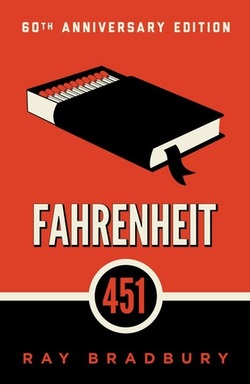
Yes, Fahrenheit 451 is a cornerstone of dystopian literature, and an effective argument against censorship... but couldn’t it be a good book, too?
The story takes place in a not-too-distantly futuristic society where entire rooms are converted into television screens, people are even more passively ambivalent to issues than they are today, and, oh yeah, the job of the “firemen” is now to start the fires, rather than stop them. Books are illegal, you see—all books—so if you’re suspected of having any of them stashed away… well, you’re going to get a visit from the firemen.
Our protagonist, Montag, is one such fireman who develops an affinity for the books he burns, and the story basically follows his struggles to make a difference in this world where no one really cares anymore.
Well, this book was certainly a disappointment. I don't know, maybe my expectations were too high going into it? But there are some pretty serious flaws with this “cornerstone of dystopian literature”:
(WARNING: BELOW THIS LINE LIE SPOILERS AND ANGER-CAPS.)
The story takes place in a not-too-distantly futuristic society where entire rooms are converted into television screens, people are even more passively ambivalent to issues than they are today, and, oh yeah, the job of the “firemen” is now to start the fires, rather than stop them. Books are illegal, you see—all books—so if you’re suspected of having any of them stashed away… well, you’re going to get a visit from the firemen.
Our protagonist, Montag, is one such fireman who develops an affinity for the books he burns, and the story basically follows his struggles to make a difference in this world where no one really cares anymore.
Well, this book was certainly a disappointment. I don't know, maybe my expectations were too high going into it? But there are some pretty serious flaws with this “cornerstone of dystopian literature”:
(WARNING: BELOW THIS LINE LIE SPOILERS AND ANGER-CAPS.)
 RSS Feed
RSS Feed





